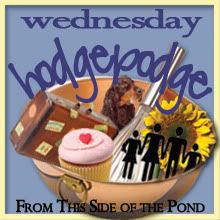The Arts and the Christian Imagination Essays on Art, Literature and Aesthetics, by Clyde S. Kilby, edited by William Dyrness and Keith Call (Paraclete Press / Mount Tabor Books / ISBN 978-1-61261-861-6 / 256 pages / Hardcover / $28.99)
 Our homeschooling community views education in the context of lifelong learning, and as part of the classical and liberal arts tradition. We recognize the value of each person as one who has been created in God's image, and who therefore shares in some of God's attributes such as the ability to imagine and create, and to form a relationship with the things that have been created. Our curriculum includes more than normal amounts of poetry, drama, music, and art, the things that many schools would treat as frills or extras; but to us they are so vital, in the literal sense of vital meaning life-giving, that we have started referring to them as "The Riches."
Our homeschooling community views education in the context of lifelong learning, and as part of the classical and liberal arts tradition. We recognize the value of each person as one who has been created in God's image, and who therefore shares in some of God's attributes such as the ability to imagine and create, and to form a relationship with the things that have been created. Our curriculum includes more than normal amounts of poetry, drama, music, and art, the things that many schools would treat as frills or extras; but to us they are so vital, in the literal sense of vital meaning life-giving, that we have started referring to them as "The Riches."
Another phrase we use is "spreading the feast," as opposed to shoving things down people's throats, but which acknowledges that as human beings we do have "affinities" or natural, God-given attractions for truth and beauty. In fact, we are so out of touch with current beliefs as to insist that truth and beauty not only do exist, but that teaching them to children, and seeking after them as adults, is part of what we are called to do as Christians.

Another phrase we use is "spreading the feast," as opposed to shoving things down people's throats, but which acknowledges that as human beings we do have "affinities" or natural, God-given attractions for truth and beauty. In fact, we are so out of touch with current beliefs as to insist that truth and beauty not only do exist, but that teaching them to children, and seeking after them as adults, is part of what we are called to do as Christians.
A writer and academic who agreed with that idea was Dr. Clyde S. Kilby, a longtime professor at Wheaton College, and author of The Arts and the Christian Imagination, a new collection of his writings from about fifty years ago. His essay "Christian Imagination" is also included in the older edition of Leland Ryken's collection The Christian Imagination, and appropriately enough it follows there right after C.S. Lewis's essay "Christianity and Culture." The subheadings include "The Bible: A Work of the Imagination"; "God, the Imaginer"; "The Failure of Imagination in Evangelical Christianity"; and "Learning to Live Imaginatively," and these are typical of the things he discusses throughout his work.
At one point Dr. Kilby refers to Lewis's description of a child on Easter morning who was heard to say "Chocolate eggs and Jesus risen," and he says "In our desperate evangelical desire for a clear, logical depiction of Jesus risen we have tended to remove the chocolate eggs...There is a simplicity which diminishes and a simplicity which enlarges...The first is that of the cliché-simplicity with mind and heart removed. The other is that of art...The first silently denies the multiplicity and grandeur of creation, salvation and indeed all things. The second symbolizes and celebrates them...[it] suggests the creative and sovereign God of the universe with whom there are no impossibilities."
So part of the problem of Christians making sense of the arts, besides needing more chocolate eggs, is that we may try to stick to what we call real, in the "life is real and life is earnest" sense, and forget that God's creation is full of amazement and grandeur, and although it may be fallen, it still reflects the power and beauty of its Creator. We have a feast laid out for us in Creation, and in the beautiful things that people have created in art, in music, in literature, things that are just as real as our everyday world of work, and that can give us a clearer picture of the love and holiness and power of the Father who inspired them.
The only complaint I have about the book is the almost unavoidable problem of repetition through the various essays and talks. Like any teacher, Dr. Kilby had favourite illustrations and examples which he re-used over the years, and reading the whole book in a short time might make you feel that you've been through a particular point several times already. On the other hand, exploring the collection of talks as a whole is a good way to get a sense of his most vital themes.
Well recommended for those wanting to dig deeper on the question of faith and the arts.
I received a free digital copy of this book from the publisher for purposes of review, but received no other compensation. All opinions (as much as humanly possible!) are my own.


